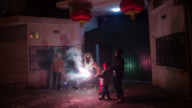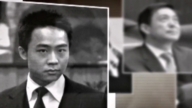【新唐人2013年03月25日讯】北京市公安局和交管局等部门公开预算,显示这两个部门2013年“公共安全”支出预算,分别近32亿8千多万和21亿多元。学者指出,中共把巨额纳税人的钱财用于“维稳”,不如用于改善民生,从根本上制造稳定条件。
3月19号,北京市公安局和交管局等部门公开预算。数据显示,北京市公安局2013年预算总额38.66亿元,其中“公共安全支出”近32.8亿元﹔北京市交管局预算23.61亿元,其中“公共安全支出”21.23亿元。
去年“十八大”前,北京市曾举行“十八大”安保动员誓师大会,除正常警力外,仅北京市就有140万治安志愿者投入实名防控和网格防控等工作。
而早在2011年3月,中国财政部发布报告说,当年中国投入警察系统、国家安全系统、民兵以及法院和监狱等“公共安全”领域预算为6244亿人民币,这一数字比2011增加了21.5%,超出了中国2010年你公开的军费预算6011亿元人民币。
“中央民族大学哲学和宗教学系”教授赵士林,质疑中共当局这种硬性的维稳做法。
中央民族大学哲学和宗教学教授赵士林:“中国公共机关包括国家机器,他所使用的经费,是不是也应该有一个监督,有一个制约,有一个批准,不能他用多少就用多少,这个问题,我们国家从立法角度,应该有一个针对性举措。”
赵士林指出,以维稳为借口,动用这么多纳税人的钱,达不到维稳的效果。
赵士林:“因为稳定不是靠硬性弹压,你欺负老百姓欺负的太厉害了。是不是?恶性事件这么多,基本的民权被剥夺。我最近在微博上写,我说叫做贪官,恶官,庸官,裸官,官官相护,大权、小权、公权、私权,权权害民。那么这种情势下,你动用多少维稳经费,你用多少国家暴力,能够弹压全社会的不满、愤怒和反抗?所以这从思路上就是错误的。”
湖北作家阮云华认为,中共当局的高压维稳,是中国社会最大的一种倒退。他说中共官员“防民甚于防川”,是专制体制下典型的封建思想。
阮云华:“他就是为了维护自己的利益,所以说他如果把这些钱都用来解决民生的话,老百姓会上访吗?他如果把这些钱用在医疗上,用在解决贫困的居民身上,你说老百姓不会感谢他们吗?他们生怕你侵犯了他们的利益,生怕跟他们争利,他们害怕,所以他们要维稳。”
赵士林认为,人民都希望生活稳定,因此只要人心稳定,能够有尊严的生存,并按照自己的意志公平做事。就具备了社会稳定的基本条件。
赵士林:“如果这样的条件不具备,你以硬性暴力的方式,花那么多钱,我听说维稳经费都超过差不多一万亿了,比国防经费都高了。这可以说是本末倒置,南辕北辙,达不到目地。”
赵士林还表示,高压维稳,代表社会不稳定,而且又没有一个真正能够建设稳定社会的体制改革,所以出现问题只能采取野蛮的办法弹压。表面上好像稳定了,但是实际上制造着更大的不稳定。
《德国之声》报导,北京民主人士胡石根也认为,安全支出费用惊人的另一主因是,警察机关以“国家安全”为名,通过特别的权力寻租方式,向国家要钱,在周永康掌舵中国政法的时代,这种情况到了一个“登峰造极”的状态:他们用所谓维稳名义,给自己捞取好处,他们夸大维稳难度,造成了安全方面惊人的支出。
胡石根认为,在未来,中共当局还会炮制出越来越多的所谓“假想敌”。
采访编辑/秦雪 后制/萧宇
Beijing’s Public Security Bureau’ Huge Stability Bill
Beijing’s Public Security Bureau and Traffic Management
Bureau recently announced details of their annual budgets.
It appears that 3.3 billion and 2.1 billion Yuan will be used
for “maintaining public security” by these bureaus in 2013.
Some Chinese scholars remarked, rather than spending
numerous revenues to “maintain stability,”
the Chinese Communist Party (CCP) should use the money
to improve people’s livelihood, which is the fundament for social stability.
On Mar 19, Beijing’s Public Security Bureau and Traffic
Management Bureau announced their next year’ budgets.
The Public Security Bureau’s budget totals 3.9 billion Yuan,
including nearly 3.3 billion Yuan for “public security issues;”
the Traffic Management Bureau has a budget of 2.4 billion,
again including 2.1 billion for “public security expenses.”
Before the CCP’s 18th National Congress in 2012,
the Beijing government held a kickoff meeting for the security staff of the congress.
Statistics show that besides the police force, only in Beijing
there are 1.4 million volunteers working on real-name control system or Internet control.
As early as March, 2011, the Finance Ministry reported
that the CCP will spend 624.4 billion Yuan that year
in public-security related systems such as police,
national security agencies, militia, courts and prisons.
This expense is 21.5% higher than that of 2010, and even
exceeded CCP’s military budget for 2010, 6 billion Yuan.
Zhao Shilin, a professor at China’s Minzu University,
questioned CCP’s hardball policies of stability maintenance.
Zhao Shilin: ”Talking about CCP’s public agencies,
shouldn’t there be some monitoring or “check and balance system” over their budgets?
Their expenses should be approved,
and they should not take whatever amount they ask for.
Our state should take some direct measures
to solve these issue, particularly through legislation.”
Zhao Shilin added, although such a great deal of revenue
is used to “maintain stability,” it will not be really effective.
Zhao Shilin: ”Social stability cannot be achieved
by suppression.
The problem is that the party is bullying ordinary people
so badly, isn’t it?
There are so many ugly acts by the officials,
and people are being deprived of their basic civil rights.
I recently wrote a microblog message
to describe China’s reality.
I wrote, “all officials protect each other, no matter corrupt,
evil, fatuous or “naked” officials;
all powers are used to harm the people,
no matter big, small, public or private powers.
In such a case how much money are needed to violently
suppress the grudges and resistance of the Chinese people?
Therefore this strategy is wrong
at a very fundamental level.”
Ruan Hua, a writer from Hubei province, remarked,
CCP’s suppressive policy in stability maintenance is the strongest sign of retrogression in China.
Ruan said, the CCP officials “worry about their people more
than about the flooding rivers,” which is typical for a dictatorship regime.
Ruan Yunhua: ”They (CCP officials) just think
of protecting their own interests.
If they spend all the money for people’s livelihood,
will there be that many petitioners?
If they spend the money in setting up medical system
for the poor, won’t the Chinese be grateful to them?
Instead, they only worry about
how you might contend for their interests.
They are scared and that is why
they have to maintain stability.”
Zhao Shilin said, all Chinese expect stable lives.
If they can live with dignity and follow their own wills,
then the public morale will be stable,
which is fundamental for the overall social stability.
Zhao Shilin: ”Now the authority fails to do that and instead
spends a great deal of money on violent suppression.
I heard that the expenses of stability maintenance almost
reach 1000 billion, even higher than the defense budget.
This is like going south by driving to the north,
and will never work.”
Zhao added that maintaining stability by suppression
only shows that the society is not stable.
Without a key reform that can lead to a real social stability,
the only way to solve a problem is to suppress it violently.
This may result in an apparent stability, however it will
lead to more instability which will break out later.
A Deutsche Welle report cited words
from the Beijing democrat Hu Shigen.
Hu said, another reason for such a numerous bill on public
security is that the police system is asking for money in the name of “protecting national security.”
When Zhou Yongkang headed the Politics and Law system,
this “power for money” mode was exploited to an extreme.
They benefited themselves
in the name of “stability maintenance.”
They also exaggerated the demand for their work,
creating astonishingly high expenditure on public security.
Hu believes, CCP will continue with its “imaginary enemies”
to legitimize its “stability maintenance.”






























